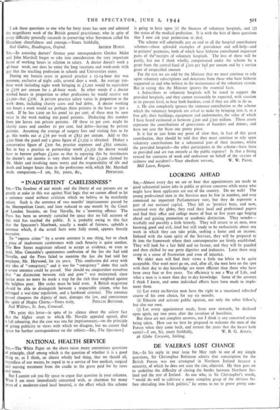" INADVERTENT CARELESSNESS"
Sta,—The freedom of our minds and the liberty of our persons are so greatly at stake in this war against Nazi logic that we cannot afford to let a sentence stand without criticism which we believe to be manifestly unjust. Such is the sentence of two months' imprisonment passed by the Metropolitan Court, and later reduced to one month by the Court of London Sessions, on Ivor Novello, for a motoring offence. The Press has been so severely curtailed for space that no full account of this trial has reached the public. It is probably owing to this fact that the Spectator's Notebook, usually a model of fairness, upholds a sentence which, if the actual facts were fully stated, appears fiercely excessive.
To "repress crime" by a severe sentence is one thing, but to check a piece of inadvertent carelessness with such ferocity is quite another. The Bow Street magistrate refused to accept as evidence, or even to read, Miss Constable's spontaneous confession of the lies she had told Novello, and the Press failed to mention the lies she had told her employer, Mr. Heywood, for six years. This confession did away with any idea of " conspiracy," and it was for "conspiracy " alone that such a severe sentence could be passed. Nor should we congratulate ourselves that "no distinction between rich and poor " was maintained, since justice must no more be made a trap for the rich than weighted against the helpless poor. Her scales must be held even. A British magistrate should be able to distinguish between a respectable citizen, who has infringed a war-time' regulation, and a hardened criminal. The sentence passed cheapens the dignity of man, damages the law, and contravenes the spirit of Magna Charta.—Yours truly, PHYLLIS BOTr0ME. Red Willows, St. Ives, Cornwall.
[We print this letter—in spite of its silence about the salient fact that the higher court to which Mr. Novello appealed agreed, after a full rehearing, that the case was one for imprisonment,—on the principle of giving publicity to views with which we disagree, but we cannot find space for further correspondence on the subject.—ED., The Spectator.]


























 Previous page
Previous page